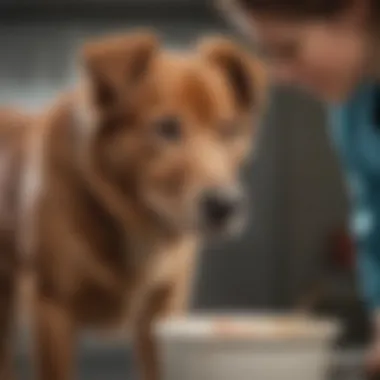Effective Solutions for Dog Diarrhea Treatment


Intro
Diarrhea in dogs can be distressing for both the animals and their owners. Understanding the implications of diarrhea is crucial as it can signal underlying health issues. Pet owners must be vigilant in assessing their dog’s health to identify the causes and appropriate treatments. This article will explore the various options available to treat diarrhea in dogs. The focus will be on dietary management, veterinary interventions, and preventative strategies.
Understanding Your Pet
Breed Traits
Certain breeds may be more predisposed to gastrointestinal issues. For instance, breeds such as Dachshunds, Boxers, and French Bulldogs can experience sensitive stomachs. Understanding these traits can guide owners in taking preemptive measures against diarrhea. It is essential to keep track of your dog's breed-specific needs.
Common Temperaments
The temperament of a dog plays a role in its overall health. Anxious or stressed dogs may show gastrointestinal disturbances more easily. Recognizing how a pet’s mood or stress level affects its health can be integral to prevention. An understanding of your dog’s behavior helps in managing its conditions effectively.
Special Needs
Some dogs may have special dietary requirements due to ailments or age. For example, older dogs or those with chronic conditions need tailored nutrition to avoid upset stomachs. Special needs should always be considered in any treatment regime or diet changes.
Pet Care Essentials
Nutrition and Feeding Guidelines
Proper nutrition is foundational in preventing diarrhea. A bland diet, typically consisting of boiled chicken and rice, is often recommended. Gradually reintroducing regular food after a bout of diarrhea is important to avoid further complications. Additionally, maintaining proper hydration is crucial. Use an electrolyte solution formulated for pets if necessary.
Grooming Tips and Techniques
Regular grooming can aid in monitoring your dog's health. Check the coat and skin for signs of distress or infection. Keep the anal area clean to prevent irritation, which can exacerbate digestive issues.
Health and Wellness
Routine veterinary check-ups can detect underlying health issues early. Maintain vaccinations and parasite control. Awareness of changes in your dog's habits or health signals is vital to catching any issues before they escalate.
Training and Behavior
Basic Training Techniques
Teaching commands and establishing a routine can help reduce stress in dogs, lowering their chances of digestive problems. Basic commands like sit, stay, and come can enhance communication between owner and pet.
Behavioral Problems and Solutions
If a dog displays anxiety or stress, recognizing and addressing underlying behavioral problems is essential. Solutions might include training, environmental adjustments, or even professional behavior consultations.
Mental Stimulation Activities
Keeping a dog mentally stimulated is essential for overall well-being. Engaging your pet with puzzle toys or training exercises can reduce anxiety levels, promoting digestive health.
Engaging with Your Pet
Interactive Games and Toys
Using interactive toys can provide mental engagement. They can divert attention from potential stressors, which can negatively influence digestion. This not only keeps the pet entertained but also aids in maintaining its mental health.
Safe Outdoor Activities
Regular outdoor activities are beneficial for both physical and emotional health. Walks, playtime at the park, and safe socialization with other dogs contribute to a well-rounded routine that supports healthy digestion.
Family-Friendly Pet Interactions
Encouraging the whole family to engage with the pet helps build a strong bond. However, it is important to maintain a calm environment, as excessive noise or activity could trigger anxiety in sensitive dogs.
Pet Adoption and Integration
Choosing the Right Pet for Your Lifestyle
Before adopting, consider your lifestyle and how a pet fits into it. Each dog has unique needs based on its breed, temperament, and history. A poor match can lead to stress for both pet and owner, potentially affecting health.


Preparing Your Home for a New Pet
A stress-free home environment is pivotal. Have necessary supplies ready, including food, bowls, and a comfortable resting place. Ensure the area is safe for dogs to explore.
Tips for Smooth Preface
If bringing a new pet home, consider gradual introductions with existing pets. Give them space to acclimatize. Monitor their interactions closely. Stress in pets can lead to digestive issues.
Always remember that understanding your dog's unique needs and characteristics is essential for their overall health and well-being.
By incorporating these insights into daily routines, pet owners can better manage and treat diarrhea. This foundation ensures that pet owners are equipped with the knowledge to maintain their dogs’ health and happiness.
Understanding Canine Diarrhea
Diarrhea in dogs is a common issue that many pet owners face. Understanding the causes and symptoms of canine diarrhea is essential for effective treatment. This section aims to clarify the basics of this condition. Recognizing the seriousness of diarrhea can guide timely intervention, which is crucial for the dog’s health.
Definition and Symptoms
Diarrhea in dogs can be defined as an increase in the frequency and fluidity of bowel movements. It can appear as mushy stools or even pure liquid. While it can be a temporary issue, prolonged diarrhea warrants immediate attention. Symptoms that often accompany diarrhea include:
- Lethargy
- Vomiting
- Decreased appetite
- Abdominal pain or bloating
These symptoms point to a disturbance in the dog’s digestive system. Monitoring your dog closely is essential, especially if changes in behavior accompany the diarrhea. Early detection can prevent dehydration and more severe complications.
Common Causes
There are many factors that can lead to diarrhea in dogs. Some of the most common causes include:
- Dietary Indiscretion: Dogs are notorious for eating things they shouldn’t. This behavior can often lead to stomach upset and subsequent diarrhea.
- Food Allergies or Intolerances: Some dogs may not react well to certain ingredients in their food, causing gastrointestinal distress.
- Infections: Bacterial, viral, or parasitic infections can disrupt normal digestion, leading to diarrhea.
- Medications: Some medications may have side effects that include gastrointestinal upset.
- Stress: Significant changes in the environment or routine can stress dogs, impacting their digestion.
Understanding these causes is vital for dog owners. Identifying the underlying issue allows for better treatment decisions and preventive measures.
Types of Diarrhea in Dogs
Understanding the types of diarrhea a dog may experience is essential for proper treatment. Dogs can suffer from different forms of diarrhea, each with unique characteristics and implications for health. By distinguishing between these types, pet owners can address the issue more effectively. The relevant types include acute diarrhea, chronic diarrhea, and the distinction between gastrointestinal and non-gastrointestinal causes. Recognizing these categories helps in determining an appropriate response and treatment strategy.
Acute Diarrhea
Acute diarrhea appears suddenly and often resolves within a day or two. It can result from various factors, such as dietary indiscretion, infections, or sudden changes in diet. Dogs may show symptoms like frequent, watery stools, lethargy, or mild vomiting.
This type of diarrhea can lead to quick dehydration. It is crucial for owners to monitor their dog's condition closely. If the dog has acute diarrhea without other serious symptoms, a brief fasting period may be beneficial, followed by a return to a bland diet. However, if diarrhea persists longer than 24-48 hours, it is important to consult a veterinarian.
Chronic Diarrhea
Chronic diarrhea lasts for more than two weeks. This can indicate a more serious underlying condition such as allergies, metabolic disorders, or even parasitic infections. The symptoms are similar to acute diarrhea but can include weight loss over time. Dogs with chronic diarrhea might also show less energetic behavior.
Diagnosing chronic diarrhea often requires veterinary attention. The veterinarian will likely perform tests to identify any underlying health issues. Treatment plans vary based on the revealed causes. Therefore, it is crucial to keep a close observation of your dog's health to provide the vet with detailed information.
Gastrointestinal vs. Non-Gastrointestinal Causes
Understanding whether the diarrhea is gastrointestinal or non-gastrointestinal is important for diagnosis. Gastrointestinal causes typically include infections, dietary changes, or the ingestion of toxins. Symptoms often involve not just diarrhea but also vomiting or discomfort in the abdomen.
On the other hand, non-gastrointestinal causes involve broader health issues such as hormonal imbalances or even stress-induced changes. These may not show outward symptoms in the digestive tract. Differentiating between these types can lead to appropriate examinations and treatments.
"Identifying the type of diarrhea is crucial in determining the appropriate care needed for a dog. Not every case requires the same treatment."
Initial Steps for Treatment
When a dog experiences diarrhea, owners must take immediate action. Understanding the initial steps for treatment is critical as it helps in determining the proper course of action. The first response can influence the overall health of the animal. Owners should be observant and quick to assess the situation. Taking immediate steps can prevent complications.
Assessment of Severity
Before diving into treatment, assessing the severity of the diarrhea is essential. Pet owners should look for signs that indicate how serious the situation is. Key symptoms to observe include:
- Frequency of diarrhea: How many times has the dog defecated in a day? Frequent episodes may suggest a more serious issue.
- Consistency of stools: Watery stools are a more pressing concern compared to mushy ones.
- Presence of blood or mucus: Any visible blood or unusual substance can indicate an urgent need for veterinary care.
- Overall behavior: Is the dog lethargic? Are they eating or drinking normally? Behavior can be an important indicator of distress.


A clear understanding of these aspects will provide insights into whether immediate veterinary help is required. In some cases, the diarrhea can resolve itself with minor adjustments to diet or routine. In others, it might signal a serious underlying problem.
Understanding Hydration Needs
Diarrhea can lead to rapid dehydration in dogs. Hydration is a priority that owners should monitor closely. Dogs can lose significant amounts of fluids and electrolytes during an episode of diarrhea. Here are the steps to help understand and manage hydration needs:
- Assess fluid loss: A general rule is to ensure that your dog continues to drink water. Noticing a decrease in drinking can be alarming.
- Offer frequent small amounts of water: Instead of allowing large amounts in one go, providing smaller portions may be easier for the dog to keep down.
- Consider oral rehydration solutions: There are specific products designed for dogs that can replenish lost electrolytes and fluids. Options like Vet’s Best Hydrate or Rebound Recovery might be helpful.
- Monitor physical signs of dehydration: Check for signs such as dry gums, increased skin elasticity, and whether the dog is more passive than usual. If any signs are evident, it’s critical to seek veterinary care.
Maintaining hydration is crucial for recovery and well-being, especially during episodes of diarrhea. Taking these initial steps lays the groundwork for effective treatment, ensuring the dog's health does not further deteriorate.
Dietary Management
Dietary management plays a critical role in the treatment of dogs suffering from diarrhea. The food a dog consumes has a direct impact on their gastrointestinal health. An effective dietary strategy can not only alleviate symptoms but also aid in the recovery of the intestines. By carefully selecting the right types of food and making necessary modifications, pet owners can significantly enhance their dog's chances of a swift return to health.
Temporary Dietary Modifications
When dealing with acute diarrhea, temporary dietary modifications are a standard approach. The initial goal is to allow the dog's digestive system some rest while still providing necessary nutrients. A common method is the **fasting period**, which usually lasts for 12 to 24 hours. Note that water should always be available to prevent dehydration.
After the fasting period, it is advisable to introduce easily digestible foods. Some examples include:
- Boiled white rice
- Plain boiled chicken without skin
- Plain pumpkin (not the spiced pie filling)
These foods are gentle on the stomach and can help firm up stool. Gradually reintroducing the dog's regular diet over several days is important to prevent any gastric upset.
Recommended Foods for Recovery
Once the dog's condition stabilizes, choosing the right recovery foods is essential. Specific dietary options can help regenerate gut health. Many commercial dog foods are tailored for gastrointestinal recovery. These foods often contain higher amounts of fiber and are low in fat.
Some recommended foods for recovery include:
- Hill's Science Diet i/d
- Royal Canin Gastrointestinal
- Purina Pro Plan Veterinary Diets EN
For a more home-cooked approach, consider adding:
- Cooked sweet potatoes
- Plain yogurt (check for active cultures)
Adding probiotics can also enhance digestive health during this recovery phase.
Probiotics and Supplements
Including probiotics in your dog's diet is highly beneficial. Probiotics are live microorganisms that can restore balance to intestinal flora. They help in digesting the food more efficiently and foster overall gut health.
Some effective probiotic supplements for dogs include:
- FortiFlora by Purina
- ProviableDC by VetriScience
These can improve cases of diarrhea by stabilizing the gut microbiome. Additionally, supplements such as pumpkin powder and soluble fiber can provide excellent support. Always consult with a veterinarian before introducing new products to ensure they are appropriate for your dog's condition.
Important Note: Always discuss any dietary changes with a veterinarian, especially if diarrhea persists beyond 24 hours. Prompt medical attention is crucial.
In summary, dietary management is a fundamental part of treating canine diarrhea. Temporary modifications, recovery foods, and the use of probiotics are all vital strategies that can aid in restoring your dog's health. Proper dietary care not only focuses on symptom relief but also contributes to the overall wellness of your pet.
Veterinary Treatment Options
The treatment of diarrhea in dogs frequently necessitates the expertise of a veterinarian. Diarrhea can arise from various underlying conditions, some of which require professional intervention. Recognizing when to seek veterinary care is essential for ensuring the health and well-being of your canine companion. The veterinary approach to treatment includes prescribing medications and conducting necessary diagnostics, which significantly aid in achieving effective recovery.
Medications Prescribed by Veterinarians
Veterinarians often prescribe a range of medications tailored to the specific cause of diarrhea in dogs. The choice of medication depends on factors like the severity and duration of the diarrhea, the dog's age, and overall health. Common medications include:
- Antimicrobial agents: These may be recommended when diarrhea is due to bacterial infections. They help to eliminate harmful bacteria and restore balance in the intestines.
- Probiotics: These supplements promote healthy gut bacteria, aiding in digestion and recovery from diarrhea. They are helpful in restoring intestinal flora, especially after antibiotic use.
- Antidiarrheal medications: Some medications can help manage symptoms by slowing down intestinal movement. However, these are not always advisable, especially if an infection is present.
- Anti-inflammatory drugs: If diarrhea is linked to inflammation in the gastrointestinal tract, corticosteroids may be prescribed to reduce inflammation and alleviate symptoms.
It is crucial to avoid giving over-the-counter medications without veterinary guidance, as some could be harmful to dogs. Properly prescribed medications are tailored to target the specific issues contributing to diarrhea while supporting recovery.
Diagnostics and Testing


Determining the root cause of diarrhea often requires thorough diagnostic procedures. A veterinarian may recommend several tests before establishing the correct course of treatment. Diagnostic tools include:
- Fecal examinations: A stool sample can reveal parasites, bacteria, or other abnormalities that may be causing diarrhea.
- Blood tests: These can help assess the dog's overall health and detect underlying conditions such as infections or organ dysfunction.
- Ultrasounds or X-rays: Imaging studies may be necessary to evaluate internal structures, especially if intestinal obstructions or more serious issues are suspected.
After conducting these tests, the veterinarian will analyze the results to decide on the best treatment plan. Proper diagnosis is foundational for effective treatment and recovery, emphasizing the importance of veterinary involvement in cases of diarrhea.
Consulting with a veterinarian is invaluable when your dog suffers from diarrhea, ensuring that treatment is both safe and effective.
Preventative Measures
Preventative measures are crucial for ensuring the ongoing health and well-being of dogs, especially concerning gastrointestinal issues like diarrhea. The significance of prevention lies in its ability to ll reduce the risk of future health problems. Owners can take action to minimize the chances of diarrhea occurring. This approach emphasizes the importance of maintaining a stable and healthy environment for pets.
Vaccination and Regular Check-ups
The role of vaccinations cannot be understated. Vaccines protect against various diseases that may lead to gastrointestinal upset, such as parvovirus. Regular veterinary check-ups play an equally vital role in this preventative approach. During these consultations, veterinarians can identify early warning signs of health issues that could manifest as diarrhea. Thus, routine visits allow for proper vaccinations and tailored health advice for each dog's specific needs. Investing in regular veterinary care is a proactive way to safeguard against illnesses.
Healthy Eating Habits
Nutritional choices directly influence a dog’s digestive health. It is essential to provide a balanced, species-appropriate diet. Choosing high-quality dog food that meets AAFCO standards helps ensure dogs get all necessary nutrients. Incorporating fiber-rich foods into their diet can enhance digestion. Moreover, introducing new foods gradually allows the dog's system to adjust, reducing the potential for upset. Establishing a feeding schedule also aids in digestion. Eating at consistent times can help the digestive system function optimally.
Avoiding Environmental Toxins
Environmental toxins can trigger serious health issues, including diarrhea. It is vital to be aware of harmful substances that pets might encounter. Common toxins include:
- Human food that is unsafe for dogs, such as chocolate or raisins
- Insecticides and herbicides used in gardens
- Certain plants known to be toxic, like azaleas and oleander
Keeping homes clean and free from hazardous materials helps prevent accidental ingestion or exposure. Educating oneself about pet-safe products is also critical. Awareness and proactive measures can significantly reduce health risks, ensuring pets remain healthy and happy.
"An ounce of prevention is worth a pound of cure."
This truth is especially applicable to maintaining a dog's health and preventing diarrhea.
Monitoring and Follow-Up
Monitoring and follow-up are crucial components in addressing diarrhea in dogs. After implementing treatment strategies and making dietary adjustments, pet owners need to keep a close watch on their dogs’ health. This ongoing observation has several advantages. It helps in identifying how well the dog is responding to treatment. Regular monitoring allows for prompt action if the condition does not improve or worsens. Additionally, keeping track of changes in behavior or stool can offer insights into the dog’s overall digestive health.
One significant benefit of effective monitoring is the ability to catch signs of potential complications early. Diarrhea can sometimes lead to severe dehydration or electrolyte imbalances. These conditions can escalate quickly and lead to further health issues. Thus, consistent observation can help in mitigating risks.
Here are some specific elements for monitoring your dog’s condition:
- Observe stool characteristics: Note the consistency, color, and presence of any unusual elements such as blood or mucus.
- Track the frequency of bowel movements: An increase in frequency may indicate worsening symptoms, while normalization is a positive sign of recovery.
- Check overall demeanor: Assess your dog’s energy levels and behavior. Lethargy or changes in appetite can signal that something is amiss.
By staying vigilant, owners can ensure their dogs receive the best possible care and intervention as needed.
Recognizing Signs of Improvement
Recognizing signs of improvement is essential in the ongoing assessment of a dog’s recovery from diarrhea. Improvement might be gradual and subtle, so knowing what to look for can aid in distinguishing between recovery and lingering issues.
Here are some key signs to monitor:
- Normalization of stool: As the dog heals, the feces should return to a healthy consistency, typically firm and brown.
- Restoration of appetite: A return to normal eating habits indicates that the digestive system is beginning to recover.
- Increased energy levels: A more active and lively demeanor suggests that the dog is on the mend.
Pet owners should also consult with a veterinarian about what changes to expect during recovery. This will help provide a clearer understanding of the healing process.
When to Seek Further Help
Knowing when to seek further help is integral to ensuring your dog’s health and safety. While many cases of diarrhea are manageable at home, there are situations when professional assistance is necessary.
Here are some indicators that warrant a veterinary visit:
- Persistent diarrhea: If diarrhea lasts more than a couple of days, it is time to seek help.
- Signs of dehydration: Symptoms such as dry gums, excessive drooling, or lethargy indicate dehydration and require immediate attention.
- Blood in stool or vomit: The presence of blood is a concerning sign that merits prompt veterinary evaluation.
- Severe abdominal pain: If your dog shows signs of discomfort when the abdomen is touched, veterinary advice is necessary.
Always trust your instincts as a pet owner. If something feels wrong, don’t hesitate to reach out to a veterinarian.
By being proactive and understanding the necessary steps, you can effectively manage your dog’s diarrhea and its aftermath.
End
In the journey of caring for a dog, understanding how to effectively manage diarrhea is crucial. This article has provided insights into various aspects of canine diarrhea, weaving together the intricacies of symptoms, underlying causes, and treatment options. The discussion is not merely academic; it highlights the need for practical actions that owners can take to support their pets.
Summary of Best Practices
Here are the essential points to remember:
- Assess Severity: First, determine how serious the diarrhea is. Look for symptoms like lethargy or bloody stools.
- Diet Management: Implement temporary dietary changes to ease gastrointestinal distress. Consider bland options like boiled chicken or rice.
- Hydration: Ensure your dog remains hydrated, as diarrhea can lead to rapid fluid loss.
- Veterinary Consultation: If symptoms persist or worsen, seek help from a veterinarian. They can provide specialized care and may perform diagnostics.
- Preventative Care: Regular check-ups and vaccinations contribute to long-term health and minimize risks of gastrointestinal issues.
Addressing diarrhea in dogs is not just about treatment; it involves understanding their overall health. By following best practices, dog owners can greatly reduce the impact of diarrhea and support their pet's well-being. With knowledge and vigilance, managing cases of diarrhea can transform from a distressing situation into an easily navigated challenge. The health of your furry companion depends on timely interventions, informed choices, and, when needed, guidance from veterinary professionals.



